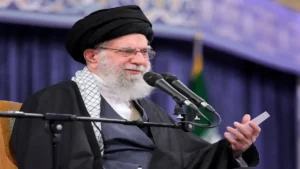The government appointed Jaya Verma Sinha as the first woman Chairperson of the Railway Board, the top decision-making body for the Ministry of Railways. Ms. Sinha is the first ever woman to head the Board in its 118-year-old history. The Railway Board came into effect in 1905. She will assume office on or after September 1, and before this she was the Member (Operations and Business Development). She was at the forefront while handling the aftermath of the tragic Balasore accident which killed 291 people. Her tenure will be till August 31, 2024.
Know more about Ms. Sinha
Ms. Sinha was earlier slated to retire on October 1, but she will be re-employed the same day till her tenure gets over. She succeeds Anil Kumar Lahoti. Ms. Sinha is an Alumnus of the Allahabad University. She joined the Indian Railway Traffic Service in 1988 and worked in the Northern Railway, South Eastern Railway and Eastern Railway. She has also served in Centre for Railway Electrification (CORE). She also worked as Railway Advisor in the High Commission of India, Dhaka, Bangladesh for four years. The Maitree Express from Kolkata to Dhaka was inaugurated during her tenure in Bangladesh. She also worked as the Divisional Railway Manager, Eastern Railway, Sealdah Division.
About the Railway Board of India
The Railway Board of India is the apex body of the Indian Railways. It is responsible for the overall administration and management of the railways. The board is headed by the Chairman, who is a member of the Union Cabinet. The other members of the board are the Railway Minister, the Financial Commissioner, the Principal Chief Engineer, and the Principal Chief Accounts Officer.
The Railway Board has its headquarters in New Delhi. It is divided into several departments, each of which is responsible for a specific area of railway operations. These departments include the Traffic Department, the Engineering Department, the Finance Department, the Personnel Department, and the Stores Department.
The Railway Board is responsible for formulating policies and strategies for the development and operation of the railways. It also monitors the performance of the railways and takes corrective measures as necessary. The board also interacts with the government and other stakeholders to ensure the smooth functioning of the railways.
The Railway Board is a vital institution for the Indian Railways. It plays a key role in ensuring the efficient and effective operation of the railways. The board is constantly working to improve the railways and make them more accessible and affordable to the people of India.
Here are some of the functions of the Railway Board of India:
- Formulating policies and strategies for the development and operation of the railways.
- Monitoring the performance of the railways and taking corrective measures as necessary.
- Interacting with the government and other stakeholders to ensure the smooth functioning of the railways.
- Approving major projects and investments.
- Allocating resources to different railway zones.
- Overseeing the recruitment and training of railway personnel.
- Ensuring the safety and security of railway operations.
- Promoting research and development in railway technology.
- Representing the Indian Railways at international forums.
The Railway Board is a powerful body that has a significant impact on the Indian Railways. It is responsible for the overall administration and management of the railways, and its decisions have a major impact on the lives of millions of people.




 Iran’s Supreme Leader Ayatollah Ali Kham...
Iran’s Supreme Leader Ayatollah Ali Kham...
 Which Country Officially Uses Two Differ...
Which Country Officially Uses Two Differ...
 Historic Glory! Jammu & Kashmir Win ...
Historic Glory! Jammu & Kashmir Win ...








